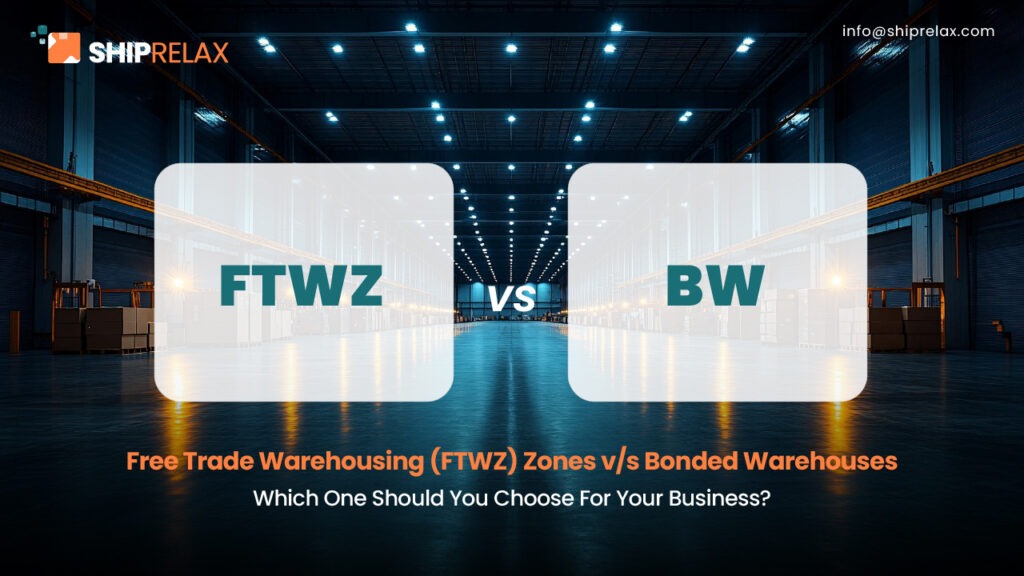
FTZ vs Bonded Warehouses: Which is the Best Option for Your Business?
When goods are imported into or exported out of the United States, they are often stored in any of two types of warehouses: Bonded Warehouses or Free Trade Warehousing Zones (FTWZ) warehouses. While they share some similarities, they have crucial differences, serving unique business needs involving the purpose for which they have been built, and what their limitations and storage capabilities are.
Free Trade Warehousing (FTWZ) Zones or Bonded Warehouse- Confused Which One to Choose? In the international logistics market, FTZ and bonded warehouses have significant but distinctive benefits concerning customs costs, operational flexibility, and storage.
Defining FTZs Warehouses: What Are They and Are Free Trade Zones and Foreign Trade Zones the Same?
What is an FTZ (Free Trade Zone)?
FTZ stands for Foreign Trade Zone, also referred to as Free Trade Zones. These are designated areas within a country where goods can be stored, processed, or re-exported without the immediate application of customs duties or standard import regulations. By leveraging FTZs wisely, companies can streamline their supply chain, smoothen logistics, gain complete control over their inventory, reduce regulatory challenges and reduce or eliminate particular taxes. FTZ warehouses also don’t have strict rules and regulations as bonded warehouses.
Are Free Trade Zones and Foreign Trade Zones Different or Same?
In international logistics, both these terms are used interchangeably, but they are in fact the same concept. FTZs are dedicatedly secure, duty-free spaces, often located within or near ports of entry to promote trade and streamline logistics and warehouse processes.
These zones are secure areas functioned by the Customs and Border Protection (CBP) but are generally not considered CBP territory. Moreover, FTZ can handle goods without immediate payment of duties, offering significant cost and time savings for businesses involved in international trade.
What is a Bonded Warehouse?
Bonded warehouses are unique warehouses where imported goods can be stored without needing to immediately pay import duties and taxes until they are sold or re-exported. These goods are not subject to duties until they leave the warehouse for local sale or distribution.
When goods are placed in bonded warehousing, they are stored under a special bond by the customs authorities as an obligation. This bond remains in effect until the goods are either removed for transport or officially cleared and released by customs. This warehouse facility allows businesses to defer duty payments, enhancing cash flow and offering flexibility in managing inventory.
Key Differences Between FTZ vs Bonded Warehouses

Both FTZ and Bonded warehousing facilities provide secure storage solutions but they vary in advantages and usages. Let’s find these differences in detail:
FTZ vs Bonded Warehouses
- Duty Deferral
FTZ Warehouse: Duties and taxes can be postponed until the goods are released into the domestic market.
Bonded Warehouse: Duties can be delayed until the product is withdrawn for consumption. - Manufacturing & Manipulation
FTZ Warehouse: FTZs permit repackaging, relabeling, testing, sorting, light assembly and sometimes complete warehousing.
Bonded Warehouse: Bonded warehousing is limited to basic operations like storage and repackaging. - Export Benefits
FTZ Warehouse: Ideal for products intended for re-export, potentially exempting from custom duties.
Bonded Warehouse: Allows for duty refunds if the goods are exported. - Domestic Distribution
FTZ Warehouse: Customs clearance is essential before goods can enter the local market.
Bonded Warehouse: The most appropriate solution for internal distribution as the goods are already within the customs borders. - Sets Up Costs and Complexity
FTZ Warehouse: Requires higher investment for set-ups and requires regulatory compliance.
Bonded Warehouse: The most cost-effective and allows simpler setup. - Storage Solutions
FTZ Warehouse: These facilities can store goods for an indefinite period in countries like the US however it varies.
Bonded Warehouse: These warehouses usually have a storage time limit.
So What Would You Prefer in FTZ vs Bonded Warehousing?
Are you looking for a secure, robust, and cost-effective warehouse space solution for your goods? Find out what ShipRelax has in store for you. They are a leading 3PL provider offering a wide spectrum of services to various businesses such as managing their supply chain, warehousing, logistics, and fulfillment services.
To Know more: Feel Free to Reach out to us or talk to our Experts! or Just simply mail us!

